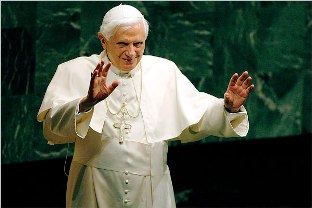“The promotion of human rights remains the most effective strategy for eliminating inequalities between countries and social groups, and for increasing security,” Pope Benedict XVI told the United Nations General Assembly in a speech Friday (April 18).

“Indeed, the victims of hardship and despair, whose human dignity is violated with impunity, become easy prey to the call to violence…
“…every state,” the Pope said, “has the primary duty to protect its own population from grave and sustained violations of human rights… If states are unable to guarantee such protection the international community must intervene…”
On Saturday, Pope Benedict’s homily to 3,000 congregants, mostly clergy and invited dignitaries, at New York’s St. Patrick’s Cathedral addressed the sex abuse scandal that has plagued the Catholic Church for the last fifty years.
“I simply wish to assure you, dear priests… of my spiritual closeness as you strive to respond with Christian hope in the continuing challenges this situation presents… I also encourage you to cooperate with your bishops who continue to work effectively to resolve this issue.”
While both issues deal with human rights, there is a disappointing contrast in both tone and language between the two speeches. While the first calls for clear and unequivocal action, the second appears vague and appeasing.
In the first, he talks about “…the victims of hardship and despair, whose human dignity is violated with impunity…” a clear reference to the people of Darfur. But couldn’t those same words apply to the roughly 12,000 victims of sexual abuse at the hands of approximately 5,000 priests?
In the second, “I simply wish to assure you… of my spiritual closeness as you strive to respond… [and] encourage you to cooperate with your bishops… to resolve this issue.”
Is this the head of the Catholic Church addressing his clergymen about a 50-year-old crisis and cover-up or a middle manager talking to his staff about a quarterly decline in sales?
Benedict did address the sex abuse scandal in three previous talks in the U.S. and has met with some of its victims, but so far the only hint of any action came in a carefully worded statement from a top Vatican official on Friday saying that the church was “…considering changes to the canon laws that govern how it handles such cases.” Only “considering.”
The New York Times reported that, “Ann Burke, an Illinois Supreme Court justice and member of a National Review Board appointed by the bishops to help the church recover from the scandal, is among three board members who met in 2004 with Cardinal Joseph Ratzinger, before he became Pope Benedict a year later.
“‘We named names, told him how cardinals and certain bishops were so uncooperative,’ she said. ‘When we left the meeting, he said, ‘Thank you very much, I appreciate all the information.’
“[Burke said] she is moved to see Benedict now responding to the victims, but not surprised that he had not sanctioned bishops. ‘This is an Enron crisis in the Catholic Church,’ she said. ‘The only difference is that the shareholders in Enron were able to get rid of their board of directors.’
“David Clohessy, an abuse victim… said Friday, ‘If the Pope would clearly, publicly and severely discipline even a handful of complicit bishops, bishops who knew or suspected abuse and ignored it or concealed it, that’s the easiest and most effective step. We’re not interested in punishment for punishment’s sake. We’re interested in consequences because that deters more recklessness, secrecy and deceit.’”
While making his case for a stronger human rights policy in his U.N. speech, Pope Benedict made this compelling point:
“…it is indifference or failure to intervene that do the real damage.”
When considering changes to the church’s laws in handling sex abuse cases, I hope that Pope Benedict heeds his own words.
Comments










